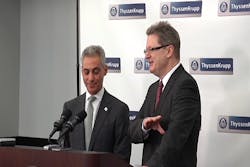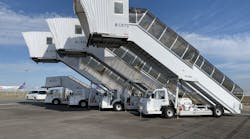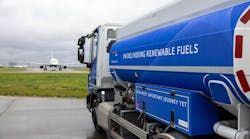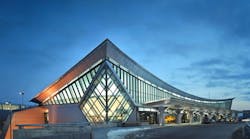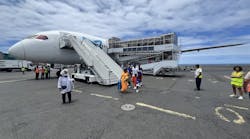Acknowledging that he's "worried" about the potential loss of hundreds of American Airlines' jobs tied to a restructuring, Mayor Rahm Emanuel on Thursday basked in a smaller but still important victory on the jobs front.
ThyssenKrupp - a German global technology and materials group with 180,000 employees in 80 countries - has chosen Chicago for its North American regional headquarters.
ThyssenKrupp is an international conglomerate that manufactures everything from elevators, escalators and passenger boarding bridges to automotive parts, cement and premium carbon steel. That will not only bring 100 high-paying jobs to the city, it will also give Chicago some of its swagger back after the prestige blow of losing Aon's headquarters to London.
Jobs-wise, Aon is a lesser blow. Even as Aon moves its headquarters to London to reduce its tax burden and expand its global business, the insurance and financial services giant is expanding its Chicago work force by 750 employees. The company is also maintaining its commitment to Chicago charities and its long-term lease at the Aon building "proving they're here to stay," as Emanuel put it.
American Airlines is a far greater concern. The nation's third-largest airline wants to eliminate 13,000 jobs and add Chicago flights to remake itself under bankruptcy protection. The reduction could cost Chicago hundreds of jobs. American is O'Hare Airport's second-largest carrier. AMR, the airline's parent company, has roughly 9,900 Chicago area employees but aims to cut its labor costs by 20 percent after negotiations with its three major unions.
"Am I worried? I'm Jewish. I worry a lot. It just comes with the DNA," said Emanuel, who has ballyhooed the 13,000 private-sector jobs created since he took office.
Short-term, the mayor disclosed that American plans to "pull back from one international flight" at O'Hare, while maintaining its "dual-hub" here. After meeting with American, the mayor refused to say how many Chicago jobs would be lost.
"While American is gonna work through a series of issues - and I don't minimize 'em because it affects people and their lives - they will still maintain their footprint here, which is essential for Chicago's overall economic growth," he said.
ThyssenKrupp neither asked for nor received a city subsidy. It wasn't necessary, according to Torsten Gessner, chairman and CEO of ThyssenKrupp North America.
"Our position was that the decision should be based on facts. Every economic incentive is a short-term thing," Gessner said. "[It's about] getting what we are looking for and we are looking for the best people we can get, the nicest place, the best logistics, a good time window to Europe. For a German company, that's an important point for us.... Based on that, we have made the decision."
Gessner said he got only "one promise to come here" - and it has to do with his wife, who was born in Italy. "Italian people don't like cold winter. The people here in Chicago - they promised me that the next winters will all be like this winter," he said.
Copyright 2012 Sun-Times Media, LLCAll Rights Reserved
